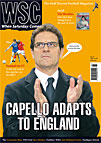 Poor organisation has turned the battle for tickets for the FA Cup semi-finals into a luck-of-the-draw contest, writes Tom Whitworth
Poor organisation has turned the battle for tickets for the FA Cup semi-finals into a luck-of-the-draw contest, writes Tom Whitworth
The four participating clubs in this season’s FA Cup semi-finals had the responsibility of fairly distributing their 33,000 Wembley tickets. They have each failed in various ways. The FA had reduced the original pricing structure of £55-£95 to £25-£55 in an attempt to ensure demand was sufficient to fill every seat. But all four clubs compelled fans to purchase tickets for games that followed their quarter-finals rather than rewarding past loyalty.
West Brom took what seemed to be the fairest approach, ensuring that each of their 24,000 season-ticket holders, members and corporate customers were offered a place. After this, registered fans who had attended five or more previous games this season were offered one ticket. But at the same time, a second ticket was also made available to those same season-ticket holders, members and corporates who had already got first preference. Additionally, a seat was offered to anyone who bought a season ticket for 2008-09.
Portsmouth gave season-ticket holders and members first rights; season-ticket holders could then buy two more in the second phase – meaning that some seats could go to fans who’d been to precisely no games this season. Third rights, in which more than 6,000 people entered a ballot for 3,000 tickets, went to those who visited Old Trafford in the quarter-final or had attended the games against Villa and Birmingham that followed the Man Utd tie. Like West Brom, Portsmouth could not resist pushing purchases for subsequent games in order to boost attendances, rather than relying on past support given during the 30-plus games already played this season. After that, anybody on the club computer battled for the remaining 6,500 seats. Predictably, many fans, including season-ticket holders, missed out in their allotted phases as the external agency that the club used couldn’t cope with the number of calls.
Barnsley used a flawed scheme that had featured earlier in their Cup run. They have around 7,000 season-ticket holders, yet chose to offer each of them two tickets – out of a 6,000 allocation – for the fifth-round trip to Anfield. Many season-ticket holders therefore missed out, while many non-holders made the trip as guests of friends or family. The club’s general manager, Don Rowing, conceded that this policy was “in hindsight… wrong” and promised to consult with the supporters’ trust in future. Despite this, the two-ticket policy was retained for the home quarter-final against Chelsea. For Wembley, each Barnsley season-ticket holder was offered four tickets, allowing them to take along the family members/neighbours/postmen of their choosing. Fans who attend some games but don’t have a season-ticket holder as a friend had to wait until the general sale, where the last 1,200 seats were sold at Oakwell on a first come, first served basis.
Cardiff gave “ambassadors” – those who renew season tickets by the end of May – and regular season-ticket holders priority, before allowing away members to apply. The club also offered additional tickets to new and returning “ambassadors” and season-ticket holders, while promising places to anyone who attended the Hull game on March 12, three days after their victory at Middlesbrough.
Big clubs will always receive criticism for their distribution policies, as demand will far outstretch supply. But four clubs with a much more localised fanbase have resorted to exploitative methods that squeeze a little extra cash from their success. Clubs should not use systems that require future commitments, such as season tickets for West Brom fans, rather than recognising past loyalty. For instance, the England team’s membership scheme, EnglandFans, allocates most tickets on the basis of “caps” awarded for previous home-and-away attendance. Sheffield United operate a similar points system. The semi-finalists might claim that they don’t have enough guaranteed big games to put such systems in place, but businesses that turn over millions of pounds annually have no excuse for such amateurishness.
Followers of the winning teams will have to hope that the final allocation is properly handled. In order to satisfy the “football family”, it’s likely that both finalists will be given 8,000 fewer seats than for the semi.
From WSC 255 May 2008